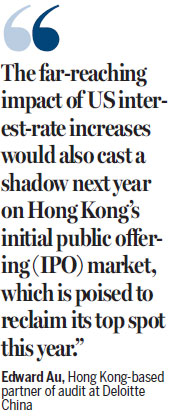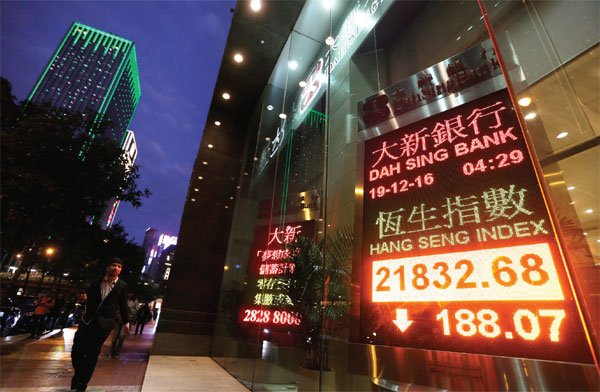Capital outflow curbs, rate woes spook investors
Updated: 2016-12-20 07:55
By Luo Weitengin Hong Kong(HK Edition)
|
|||||||
|
Worrisome news about the Chinese mainland's measures to curb capital outflow, as well as apprehension over the quickened pace of US interest-rate hikes, continued to rattle the Hong Kong stock market on Monday, with the benchmark stock index hitting a four-month low. Experts said the city's stock market would have to brace itself for more volatile sessions in the near future. Roy Liu / China Daily |
Hong Kong stocks continue losing streak as city joins global, regional sell-off
Hong Kong stocks lost ground for the third trading session in a row on Monday as investors ran for cover on moves by the Chinese mainland to halt capital outflow, as well as hawkish remarks by senior US Federal Reserve (Fed) officials that more interest-rate hikes would be in store than anticipated.
A tightening grip on capital outflow from the mainland, exacerbated by a flight of funds from Hong Kong, contributed to the weak local market sentiment, while comments by Fed official Jeffrey Lacker that interest rates might have to go up more than three times next year spurred a sell-off in regional equity markets.
The benchmark Hang Seng Index lost a further 0.85 percent, or 188.07 points, to finish at 21,832.68 on Monday, hitting a fresh four-month low and tracking its 1.94-percent slump last week after the Fed raised borrowing costs for the first time this year, with projected three more increases next year. Hong Kong-based insurer AIA Group shares dropped 1.24 percent to HK$43.85 as new restrictions on mainlander investors buying insurance in the SAR took effect over the weekend.

Purchases via China-issued MasterCard and Visa have been capped at $5,000 per insurance product which, basically, put an end to a once-popular way out resorted to by mainlanders. Under the new curbs, mainland people will not be able to swipe credit cards multiple times as part of efforts to circumvent the slew of restrictions on insurance-related capital outflows from the country.
"As the mainland tightens its grip on capital flows into Hong Kong, and capital exodus in Hong Kong exacerbates with the United States heading for a monetary tightening cycle, the city's stock market would be bracing itself for more volatile sessions in the near future," said Hannah Li Wai-han, a strategist at UOB Kay Hian (Hong Kong).
The far-reaching impact of US interest-rate increases would also cast a shadow next year on Hong Kong's initial public offering (IPO) market, which is poised to reclaim its top spot this year, said Edward Au, Hong Kong-based partner of audit at Deloitte China.
Echoing views of its counterpart KPMG, Deloitte said it expects the Hong Kong Stock Exchange to secure the crown of being the world's leading IPO venue this year. However, the local stock market may have to compete with its US and Chinese mainland peers as the top venue for IPOs.
By yearend, the local stock market is projected to attract some 120 companies, raising funds of up to HK$194.7 billion, compared with 124 firms raising HK$262.1 billion in their Hong Kong listings last year.
In particular, listings from mainland-based financial services institutions contributed to nearly 70 percent of the total funds raised so far - up 53 percent from 2015.
Au anticipated four to five "sizeable" flotations in Hong Kong next year, including some involving major financial technology (fintech) enterprises. A greater number of small- and medium-sized mainland companies is also expected to head south to trade on the Hong Kong bourse.
sophia@chinadailyhk.com
(HK Edition 12/20/2016 page9)
